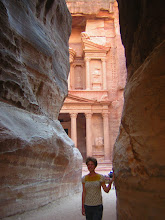I had forgotten, in my three years away from it, how much I enjoy Arabic: it's hard, what with the unfamiliar, hack-up-your-throat phonemes, complicated grammar, huge lexicon*, and diglossic sociolinguistic situation. Arabic's difficulty is what initially attracted me to it--I had a professor, my freshman year of college, who constantly complained about how hard it was, and so I registered for Arabic 101 to see what all the hype was--and its difficulty is what keeps me around. (Luckily, I have a clear distinction in my head between "grammar" and "dating.") There's just so much to love: weird number agreement rules, nominal cases, root-and-pattern morphology, and a dual. I mean, who doesn't love a good feminine dual now and then? (Grammar, people, not dating!)
One of my real favorite things about Arabic, though? The swearing. No, not the Arabic swearing--Arabs will never teach me swear words, a fact about being a woman in the Middle East that frustrates me even more than the excessive modesty requirements--but the English swearing, in Arabic: every other word, it seems, sounds like an English swear word. To wit:
(note: the "a" here is pronounced "uh" and the "q" is pronounced like a "k," but further back; see above, "hacking back-of-the-throat phonemes." All of the words are stressed on the first syllable, except for ittafaq, which is stressed on the last.)
fakkar: to think
fakka: small change
fakha: fruit
ittafaq: to agree
faqat: only
faqim: to be dangerous
faqd: loss
And those are just the f/k or q combinations; I haven't even gotten started on things like the Egyptian Arabic magabitsh, 'she didn't bring' or aashit, 'she lived.'
All this, of course, leads to the best story ever on this topic. Winter 2005, I was in an advanced Arabic literature class at BYU, in which we came across, in a short story, the word mufakk (keep in mind the pronunciation: moo-f*ck, basically). Someone asked the professor what it meant.
"Well," he said, "let's take it apart. What does that mu- mean? Right, it's the active participle marker. Okay, so a mufakk is a thing that fakks."
We are, by this point, trying to stifle our giggles as the professor continues. "So now we look at the meaning of the verb fakk. Does anyone know what fakk means?"
We smirk in silence. "No one? No one knows what fakk means?" Even the TA is laughing by this point--imagine! A BYU professor, swearing right there in class!--but nobody knows the meaning.
The professor sighs impatiently. "I can't believe nobody knows what fakk means. It means 'to screw'!"
The poor professor lost control of the class then for a good minute. The English/Arabic correspondence could not be more perfect: mufakk means 'screwdriver,' and so fakk means 'to screw in.' And so I will be forever loyal to Arabic for that alone--where else, after all, can a nice Mormon girl get some guilt-free swearing time?
*Ha! Look at me, perpetuating unfounded linguistic stereotypes! You** can't stop me!
**But I can stop me. Sigh. The idea of "number of words" in a language is pretty much meaningless, and so I can't really claim that Arabic has more words than English. I can claim, though, that Arabic writers love using as many synonyms as possible, which means a student's functional vocabulary must be, in a word, huge.
Subscribe to:
Post Comments (Atom)

7 comments:
""a student's functional vocabulary must be, in a word, huge.""
I couldn't ""Ittafaq"" more.
Google reader posted this update three times in my account today - just to make sure I would read it.
So really the universe would agree that I need these words are important!
It's good though to read your updates - I'm glad to hear you are well.
HAPPY FOURTH OF JULY!
I'm sorry, but I must finally come out of lurkdom for this one. I was laughing so hard, I was crying! (You can email me at maren1(at)gmail(dot)com if you're wondering who in the heck I am and why I read your blog.)
I remember hearing many of those words when my husband was learning Arabic and then using some of them myself when I lived in Cairo. Good times. Was the professor Dil or Kirk? Hilarious! One favorite memory of Amman is the falafel served on hot dog buns with lots of Tabasco-like sauce. It's also home to the best hummus I've ever had. Enjoy.
You know, I am so glad you were in my arabic classes with me, so I wasn't the only one stifling laughter:)
Ah, language is so much fun!
.
Oh, that's hilarious. Hilarious!
Then there is the Arabic word for winter: shitta.
Back when I was taking Arabic classes, I can remember people taking all the Araboc words that sound like English curse words and putting them into a single sentence.
Post a Comment